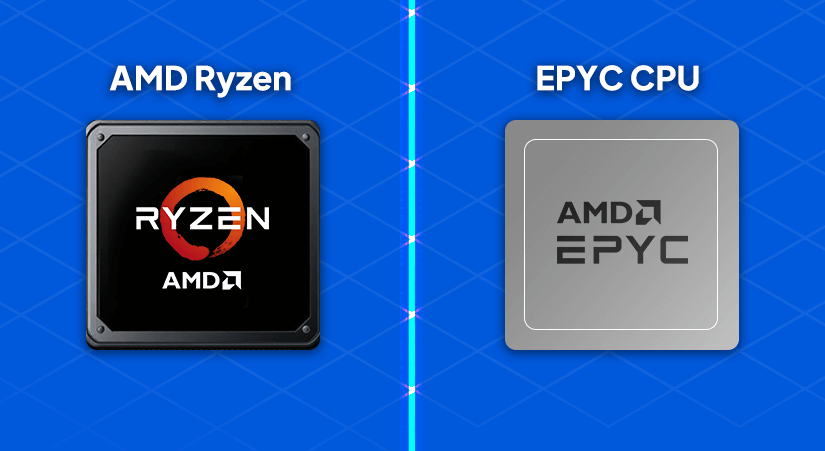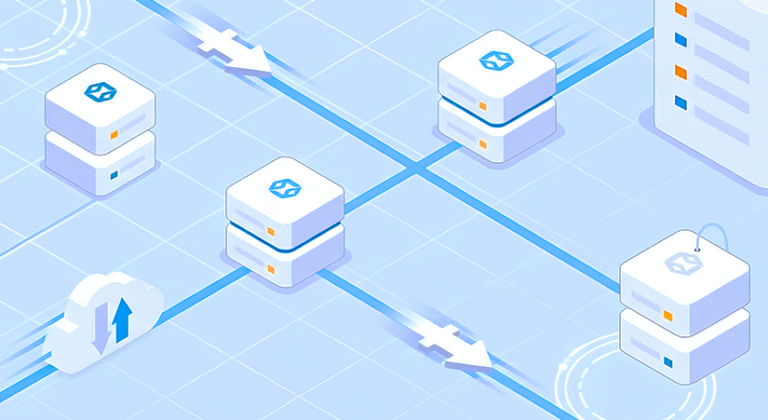
When evaluating AMD CPUs for server infrastructure, the choice between Ryzen and EPYC is rarely about simple headline specs—it’s about how underlying silicon design, platform reliability, and system features impact the operational reality of your business, whether you’re running a SaaS platform, virtualization cluster, high-traffic e-commerce, or data-intensive analytics. In today’s landscape, Ryzen is a performance desktop and budget server solution for non-critical tasks, while EPYC is engineered specifically for the data center, cloud, and enterprise workloads that demand always-on, scalable, and secure infrastructure.
Microarchitecture and Platform Philosophy
While both Ryzen and EPYC leverage AMD’s Zen microarchitecture, their system integration and intended deployment are fundamentally different.
- Ryzen (and Threadripper) target high single-thread performance, aggressive boost clocks, and cost-effective multi-core throughput for workstations, gaming rigs, and basic server roles. Ryzen CPUs offer up to 16 cores, Threadripper Pro up to 64, but both are limited by dual (Ryzen) or up to eight (Threadripper) memory channels, and 24–28 (Ryzen) or 64–128 (Threadripper) PCIe lanes. They can outpace older Xeon or entry EPYC chips in single-threaded, cache-sensitive applications, but hit architectural walls as concurrency and data needs scale.
- EPYC is a true server-grade platform, using a multi-die (chiplet) approach, with 8–12 memory channels, up to 96 cores per socket (Genoa), and 128 PCIe lanes (Gen4/5) per socket. Full support for registered ECC memory, platform-level RAS (Reliability, Availability, Serviceability), Secure Encrypted Virtualization (SEV), hardware root of trust, and remote out-of-band management (BMC/IPMI) are standard. EPYC CPUs are validated for continuous, high-availability operation, tested for redundancy, and backed by enterprise firmware and microcode support.
Core Count, Memory, and I/O Scalability
Ryzen is limited to dual-channel memory (up to 128GB, unbuffered), and PCIe lanes are quickly consumed by GPU, NVMe, and network cards. For a dev/test server, small business website, or boutique CI/CD runner, Ryzen is usually good enough. But as soon as you need to scale—multiple VMs, large datasets, or high-throughput storage/networking—these limitations become critical bottlenecks.
EPYC, by comparison, is designed for scale. Eight or more memory channels per socket (6TB+ RAM), 128 PCIe lanes (ideal for NVMe, multi-GPU, or high-bandwidth network environments), and seamless NUMA-aware multi-socket support mean EPYC can handle dozens or hundreds of VMs, containers, high-traffic web apps, and data-intensive databases without saturating memory bandwidth or running out of PCIe capacity.
Reliability, Availability, and Enterprise Features
- ECC Memory: While some Ryzen motherboards claim ECC support, it’s not validated for 24/7 enterprise use, and silent memory corruption is a real risk. Studies show non-ECC servers experience bit errors every few months—potentially corrupting databases, backups, or analytics. EPYC requires registered/buffered ECC RAM and is validated for mission-critical workloads.
- Remote Management: Ryzen lacks BMC/IPMI or out-of-band management, so remote recovery isn’t possible. EPYC provides these as standard, enabling provisioning, monitoring, and even bare-metal recovery from anywhere—essential for modern data centers and managed hosting.
- Security: EPYC CPUs include hardware-enforced security features: Secure Encrypted Virtualization (SEV), Secure Memory Encryption (SME), and hardware root of trust. These are critical for compliance (GDPR, HIPAA, PCI DSS), regulated industries, and multi-tenant environments. Ryzen security is basic, consumer-grade, and not suitable for enterprise risk profiles.
Power, TDP, and Thermal Dynamics
Ryzen CPUs range from 65–170W TDP (Threadripper up to 280W), and while efficient for the performance delivered, they’re not optimized for dense rack or 24/7 workloads. EPYC CPUs, on the other hand, are built for server environments, with TDPs from 120W to 400W+, but with platform-level controls for power capping, hot-plug support, and predictive failure analysis, ensuring reliability and efficiency in dense data center deployments.
Performance Benchmarks and Workload Suitability
- Single-threaded and Lightly-threaded Apps: Ryzen can provide better per-core performance, higher boost clocks, and lower latency for bursty dev/test tasks, web development, or small-scale e-commerce. For these use cases, Ryzen is a cost-effective, responsive choice.
- Virtualization, Databases, HPC, AI/ML, High-Concurrency Hosting: EPYC wins decisively. More cores, more memory, more I/O, and full platform RAS mean EPYC can run more VMs, handle larger datasets with lower latency, and deliver higher throughput with greater reliability.
Total Cost of Ownership (TCO) and Hidden Costs
Ryzen’s lower upfront cost is appealing for small deployments, but the hidden costs of downtime, lack of ECC, no remote management, and poor scaling can quickly surpass those savings. A single incident—manual reboot, silent data corruption, or a performance bottleneck—can cost more than a year’s difference in server price. EPYC, while a higher initial investment, delivers lower TCO for production workloads through reduced downtime, predictable scaling, and real enterprise support.
Threadripper: The “In-Between” Market
Threadripper (especially Pro) offers more cores and PCIe lanes than Ryzen, some ECC support, and high memory bandwidth, but it remains a workstation chip. It’s best for media creation, scientific computing, or certain HEDT workloads. As the Level1Techs community notes, HEDT is shrinking—Threadripper platforms have become more niche, less suitable for general-purpose production servers or gaming than either Ryzen or EPYC.
Real-World Scenarios and Recommendations
- Dev/Test, Low-Traffic Sites, Non-Critical Apps: Ryzen is a solid value—fast, responsive, and easy to replace. Cost savings are real for staging, internal build servers, or small business sites.
- Production, Virtualization, Enterprise Cloud, High-Traffic E-commerce, Databases, ML/AI: EPYC is the clear answer. You need ECC, remote management, multi-socket scaling, and the capacity for thousands of connections or massive datasets—none of which Ryzen can reliably support.
- Heavy Workstation/Content Creation: Threadripper Pro is for those who need vast cores/threads and memory bandwidth for niche compute or content creation. Not recommended for production hosting or gaming.
Summary Table: Critical Decision Factors
| Aspect | Ryzen | Threadripper | EPYC |
| Target Use | Desktop, dev/test, web | Workstation, HEDT | Server, enterprise |
| Max Cores/Threads | 16/32 | 64/128 | 96/192 per socket |
| Memory Support | 2 ch., up to 128GB | 4–8 ch., up to 2TB | 8–12 ch., up to 6TB+ |
| PCIe Lanes | 24–28 | 64–128 | 128 |
| ECC Support | Limited/Consumer | Partial (Pro: Yes) | Full, validated |
| Remote Mgmt/IPMI | No | No | Yes |
| Platform RAS | Basic | Workstation-grade | Full enterprise |
| Security | Consumer | Workstation | Hardware-level, SEV |
Why Dataplugs is EPYC-Only for Servers
Dataplugs’ infrastructure is built on AMD EPYC for a reason: it’s engineered for businesses that demand reliability, scalability, and security at every layer. From 6-core entry models to 256-core dual-socket servers, all Dataplugs platforms feature registered ECC memory, robust PCIe expansion, and full BMC/IPMI remote management. Our data centers in Hong Kong, Tokyo, and Los Angeles are optimized for low latency, high throughput, and enterprise compliance. With transparent pricing, rapid deployment, and 24/7 support, Dataplugs ensures your critical workloads and digital assets are protected, scalable, and future-proof.
Conclusion
If you need a server platform that can grow with your business and support true 24/7, mission-critical workloads, AMD EPYC is the clear choice—scalable, secure, and built for the realities of modern hosting. Ryzen is fast and affordable for dev/test or non-critical projects, but will bottleneck and expose you to operational risk as you scale. Threadripper serves a shrinking niche for HEDT content creators and scientific computing. For nearly every serious production deployment, the industry consensus is clear: choose EPYC.
To get expert advice, custom sizing, or discuss your hosting needs, connect with the Dataplugs team via live chat or email sales@dataplugs.com and discover how EPYC-powered infrastructure can future-proof your business.





